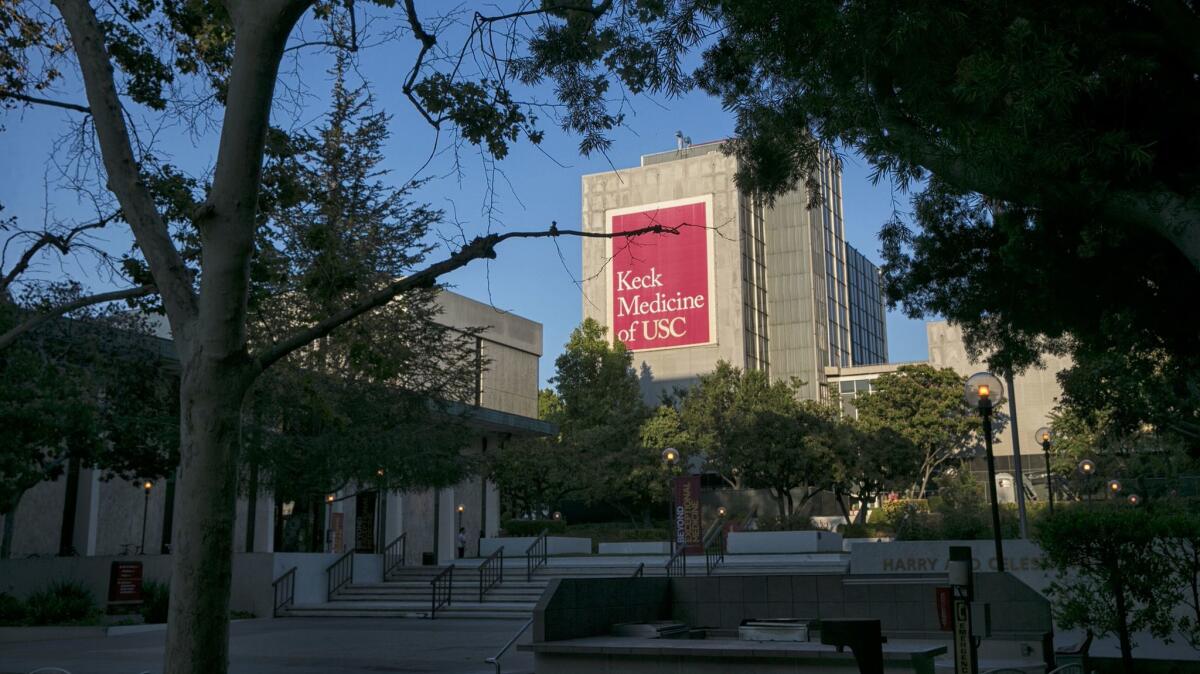Newsletter: USC has some explaining to do about ex-dean’s double life

- Share via
Good morning. I’m Paul Thornton, The Times’ letters editor, and it is Saturday, July 22, 2017. Sean Spicer is out at the White House, and sadly, “Saturday Night Live” is between seasons. Let’s take a look back at the week in Opinion.
If you grew up in Los Angeles, you probably regarded USC as Southern California’s collegiate sports powerhouse that did not compete academically with the likes of UCLA and
But on Monday, Puliafito’s and USC’s reputation took a major hit after The Times published an explosive investigative piece detailing the ex-dean’s “secret life” of drug-fueled parties with criminals and other activities while he was still in charge at the medical school. The Times’ Editorial Board called the university’s silence over Puliafito’s double life “deafening”:
When Puliafito resigned last year, he announced he was leaving to explore outside opportunities. After stepping down, he was feted by his colleagues. USC President C.L. Max Nikias praised Puliafito for helping Keck rise in the all-important U.S. News & World Report rankings of medical schools.
But there was no mention that the dean’s resignation came just three weeks after a 21-year-old woman overdosed in his presence in a Pasadena hotel room. Police found methamphetamine at the scene, and Puliafito was listed as a witness to the overdose on the official police report (which was written not at the time of the incident, but only after repeated inquiries by Times reporters.) Puliafito was not arrested or charged, even though the police found illegal drugs, but an anonymous witness called USC President Nikias’ office and told two employees about the dean’s presence at the time of the hotel overdose. Shortly after the witness called, Puliafito stepped down.
Beyond the salacious details, Puliafito’s double life and his resignation last year raise troubling questions for both the university and the Pasadena police. How much did university officials know about the dean’s behavior, and when did they learn it? Why did the university keep him on the medical faculty after learning about the incident at the hotel? Why was no police report written at the time of the overdose? Why was there so little follow-up? Were the police right not to arrest anyone? ...
USC is a private institution but it receives considerable public funding for its medical research and serves the public through its hospitals and clinics. As dean, Puliafito oversaw hundreds of medical students and thousands of professors and clinicians. The possibility that the dean engaged in serious criminal and ethical transgressions is more than a personnel matter — it reflects on the values and leadership of the university as a whole. USC’s silence is deafening.
Term limits for Supreme Court justices? Yes, please. Liberals are sending kale recipes to 84-year-old Justice
My Metro ride is smarter than your Metro ride. Joe Mathews assembles a partial list of the brainy institutions within walking distance of the Gold Line: East Los Angeles College, the Japanese American National Museum and
Be glad if your kid’s teacher has a pension. There’s a movement underway by mostly Republican governors and legislators to shift public school teachers from defined-benefit pensions into defined-contribution 401(k) plans; the assumption is that the latter are cheaper for taxpayers and provide better financial security for retiring teachers. Don’t believe it, writes UC Berkeley’s Nari Rhee. L.A. Times
Fight on! Are you a true Trojans fan?
Get our Times of Troy newsletter for USC insights, news and much more.
You may occasionally receive promotional content from the Los Angeles Times.



